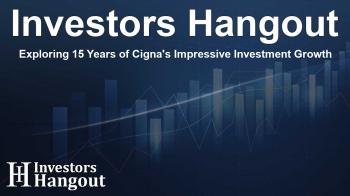Exploring 15 Years of Cigna's Impressive Investment Growth

Exploring 15 Years of Cigna's Impressive Investment Growth
Cigna (NYSE: CI) has shown impressive performance over the last 15 years, outpacing the market by an annualized rate of 3.0%. This translates into an average annual return of 14.52%. Given its current market capitalization of $77.50 billion, Cigna remains a robust player in the healthcare and insurance sectors.
Investment Growth: A Tenfold Increase
Imagine having invested $1000 in Cigna stock 15 years ago. At today’s market price of $278.62, that initial investment would have grown to a significant $7,625.07. This remarkable increase highlights the power of investing and shows how consistent performance can yield substantial monetary growth over time.
Cigna's Performance Over Last 15 Years
The key takeaway from Cigna’s performance is the profound impact of compounded returns on wealth accumulation. The concept of compounding is crucial in the investment world; it allows investors to earn returns on their initial investment as well as on any returns that accumulate over time. Therefore, a long-term view can lead to exponential growth.
The Market Trends Influencing Cigna
Several market factors have contributed to Cigna's impressive progress. The expansion of healthcare services, increased demand for insurance, and strategic acquisitions have played notable roles in solidifying its market position. By continuously adapting to changes within the industry, Cigna has maintained its relevance and effectiveness in meeting consumer needs.
Why Long-Term Investments Matter
This story of Cigna underscores the importance of long-term investments. Investors often fall into the trap of wanting quick returns, yet history shows that patience and strategic investments yield the best outcomes. Cigna's growth can serve as a testament to this principle, encouraging potential investors to consider long-term opportunities.
Conclusion: The Importance of Understanding Compounding
Ultimately, understanding the effect of compounded growth and making informed investment choices is crucial for anyone looking to enhance their financial future. Cigna as a company not only reflects strong performance but also serves as an educational example of how patience and strategic planning can lead to extraordinary returns.
Frequently Asked Questions
What is the annual return of Cigna over the past 15 years?
Cigna has achieved an average annual return of 14.52% over the past 15 years.
How much would a $1000 investment in Cigna be worth today?
If an investor purchased $1000 of Cigna stock 15 years ago, it would be worth approximately $7,625.07 today.
What factors have contributed to Cigna's market performance?
Cigna's market performance has been influenced by healthcare service expansion, increased insurance demand, and successful acquisitions.
Why is it important to invest for the long term?
Long-term investments allow for the benefits of compounded returns, leading to potentially significant growth of the initial investment over time.
What lesson can investors learn from Cigna's stock performance?
Investors can learn the crucial role of patience and strategic planning in achieving substantial long-term investment returns.
About Investors Hangout
Investors Hangout is a leading online stock forum for financial discussion and learning, offering a wide range of free tools and resources. It draws in traders of all levels, who exchange market knowledge, investigate trading tactics, and keep an eye on industry developments in real time. Featuring financial articles, stock message boards, quotes, charts, company profiles, and live news updates. Through cooperative learning and a wealth of informational resources, it helps users from novices creating their first portfolios to experts honing their techniques. Join Investors Hangout today: https://investorshangout.com/
Disclaimer: The content of this article is solely for general informational purposes only; it does not represent legal, financial, or investment advice. Investors Hangout does not offer financial advice; the author is not a licensed financial advisor. Consult a qualified advisor before making any financial or investment decisions based on this article. The author's interpretation of publicly available data presented here; as a result, they should not be taken as advice to purchase, sell, or hold any securities mentioned or any other investments. If any of the material offered here is inaccurate, please contact us for corrections.
